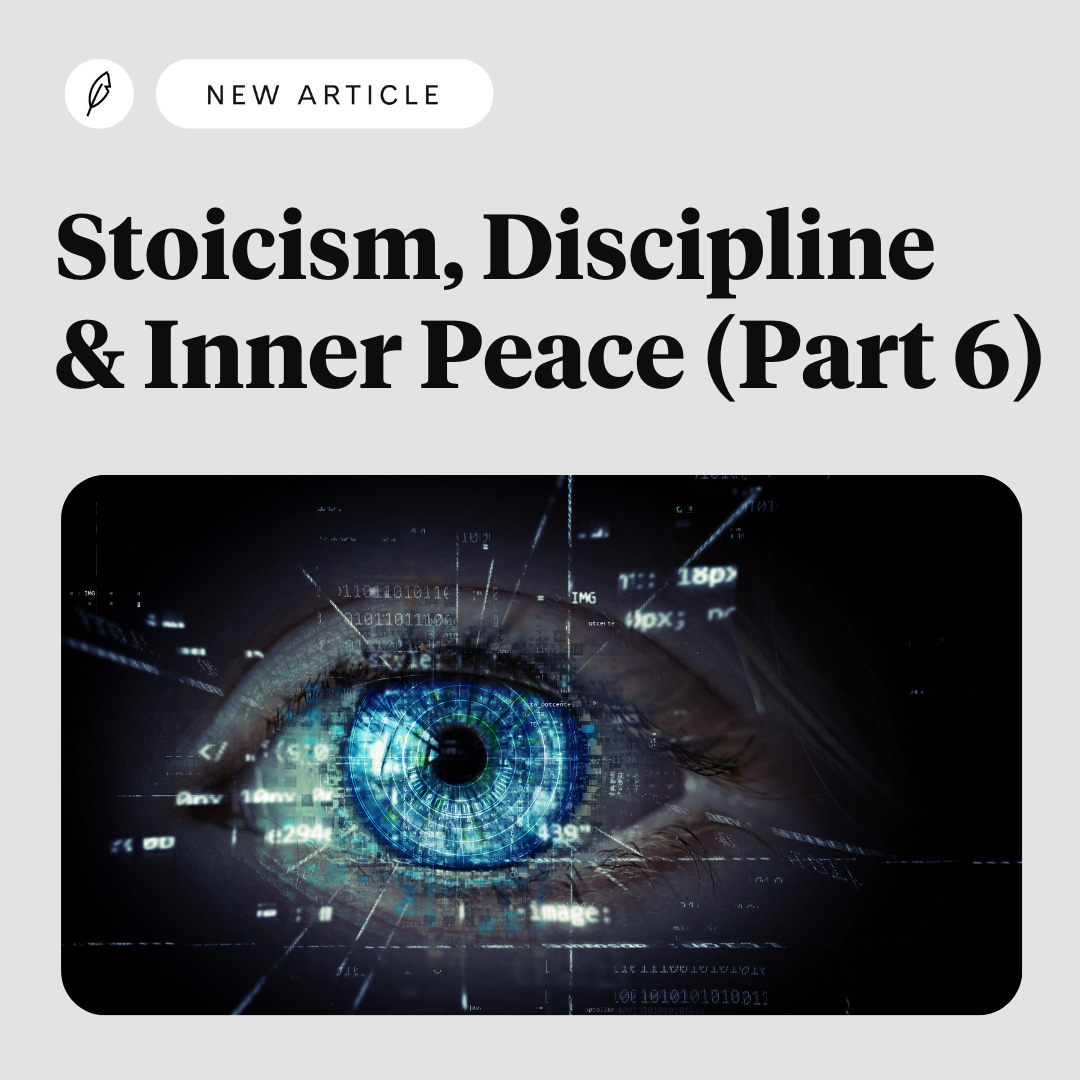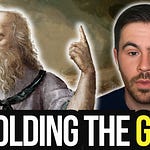We are continuing our exploration of a philosophical guide to self-development with the therapeutics of the stoics. This essay is part of our project to examine the components of neo-platonism as a theory of human development and draw parallels with the hero meta-mythology and Jungian psychology. Stoic Philosophy started in 300 BC with Zeno of Citium and continued for around 500 years until the fall of Rome. Stoicism has had numerous revivals since, including Neo-stoicism in the Renaissance and modern Stoicism in the 21st century.
Stoic philosophy provides the ethics for Neo-Platonism and solutions to the meaning crisis. Stoicism is so good at solving the meaning crisis because its philosophy evolved during two previous crises of meaning, the collapses of the ancient Greek and Roman Empires. Tim Ferris, the author of the 4-hour work week, described Stoicism as:
"An ideal operating system for thriving in high-stress environments."
This is a big part of Stoicism's success in the confusing and uncertain modern digital world. In short, Stoicism is about peace of mind, or 'Tranquility' as William Irvine writes in 'A Guide To The Good Life', and (spoiler alert) it really works.
How Stoicism Gives Inner Peace.
Stoicism aims at becoming like Socrates. Verveake argued in his recent talk on Neoplatonism that becoming like Socrates, the ideal sage, involves practising three kinds of discipline. I will attempt to flesh out these three kinds of disciplines with Stoic practices and exercises you can use in this essay.
1. Discipling your ascent to truth.
"For as Socrates said, "we ought not to live a life without examination," so we ought not to accept an appearance without examination, but we should say, "Wait, let me see what you are and whence you come"; like the watch at night, "Show me the pass." "Have you the signal from nature which the appearance that may be accepted ought to have?"
Epictetus, Discourses.
Vervaeke argues that this discipline is disciplining what you say is true or false. If you remember, Socrates is famous for saying:
"I know that I know nothing', implying the source of his wisdom is knowledge of his own ignorance. Socrates however does not wallow in his ignorance but rather pursues truth as a way of life, eventually dying for the practice saying: 'the unexamined life is not worth living', which is a claim of a kind of knowledge.
How does this knowledge contribute to inner peace? Socrates gave this quote while condemned to death when most people might tend to be a bit stressed. But Socrates valued the truth more than his own life, as he knew a life where he could not pursue the truth was not worth living. Socrates willingly consents to death rather than accept what he knows to be a lower good, rejecting his friend's proposal to run away because of his commitment to seeking the truth.
The Stoics recommend a particular spiritual attitude, which Pierre Hadot describes as
"attention (prosoche)…It is a continuous vigilance and presence of mind, self-consciousness which never sleeps, and a constant tension of mind…"
This attention, like Socrates, is to be conscious of one's errors and self-correct to limit our failures. Correcting habits like jumping to conclusions, falling into unconsciousness or taking mental shortcuts requires vigilant observation of one's cognitive processes and self-conscious dialogue within. Hadot writes,
"For the Stoics, the person who is 'awake' is always perfectly conscious of not only what he does, but who he is."
Stoicism recommends a philosophical pause to consider what is true or false? And this is what it means to discipline your ascent to truth, to be conscious of what you are identifying yourself with and caring whether what you identify with is true or false, often in opposition to things like social approval, popularity, the status quo etc., as Socrates found out, or internally to one's egocentrism and illusions.
2. Discipling your desire.
"To what purpose, then, am I presently using my soul? Ask yourself this question at every moment, and examine yourself as follows: what is presently to be found in that part of me which is called the ruling centre? And whose soul do I have at present? That of a child? That of an adolescent? That of a woman, of a tyrant, of a domestic animal, of a wild beast?"
Marcus Aurelius, Meditations.
You will start to see a pattern running throughout these kinds of discipline: agency - becoming self-directed, self-cultivating, not floating through life and being made by the environment but actively shaping your life and character yourself. Vervaeke argues that Socrates knew what to care about and how to transform himself, so he cared about the right things, that this was part of his wisdom. In other words, he was a master of values. He knew what was valuable and worth desiring and what was not valuable and not worth desiring, and how to let go of those bad desires and gain the desirable desires (which seems nearly impossible).
This discipline of desire is a theme running through all Stoic philosophy, which generally warns against pursuing lower passions of the flesh and material gain and wasting one's life and character away. Desires are driven by affect, they are emotional, and we become emotionally attached to them. The Stoics had what is called a 'Cognitive theory of emotions', that our emotional reactions come from value judgments that we make, i.e. we judge someone has wronged us, and so we become angry. As Epictetus says, we “are disturbed not by things, but the views which they take on them". The stoics recommend becoming conscious of our judgments so we can curtail powerful emotional reactions that bias our thinking and to separate our human opinions from mind-independent facts as much as possible.
Emotions are an evolutionary toolkit for operating in complex environments. They are human universals, even the facial expressions associated with specific emotions develop across cultures (although some cultures suppress these more than others), and emotions only come in two kinds: positive and negative. Emotions track if we are on course to a valued goal we care about or not. Positive emotion is dopaminergically mediated, and moderates approach behaviour which tells us when we are getting closer to a valued goal. Negative emotion is mediated by multiple circuits and moderates avoidance behaviour, indicating when we are off track toward our valued goal. This is the basic cable package - that's valuable, go towards it; that's not valuable/threatening, stay away. Why am I telling you all this? Because to discipline your desires, you need to be able to control your emotions.
Two essential truths come from these facts about emotion:
No goals equals no positive emotion.
The wrong goal equals endless negative emotion.
So what are goals? Yep, you guessed it, desires. Humans are cybernetic organisms, meaning we are goal-directed in our perceptions and actions. Tons of people these days, myself included, misinterpret Eastern spiritual traditions that you shouldn't have goals or desires (unfortunately not wanting any desires is a desire) so we become deeply miserable for the reasons mentioned above - no goals equals no positive emotion.
What Stoicism encourages is agency! Knowing your purpose, and consciously choosing to pursue the highest goals of wisdom, courage, temperance and justice. One Stoic tool for disciplining desire is the Stoic fork or dichotomy of control, which defines two categories of experience: what is under our direct control and what is not. Stoicism argues we should prioritise what is under our direct control i.e. our thoughts, actions, character, beliefs, and judgements, and accept or at least, not react emotionally to, things outside of our control, i.e. opinions of others, health, wealth, status and the vicissitudes of fate. This is a powerful way of taking advantage of the emotional systems' goal-directed nature to limit negative emotions by not setting bad or impossible goals but desiring what we simply cannot ensure will happen.
Focusing on what is outside of your control, is a surefire way to trigger the negative emotion systems and keep you in a negative feedback cycle because you’ve chosen a goal you simply can’t achieve i.e. you desire world peace and every time a bomb goes off somewhere you get an anxiety attack. A goal is a desire and a statement of value, which is how humans navigate the complex world; we pursue what is valuable and ignore the rest. Stoicism recommends building a conscious layer on top of that basic functioning and increasing agency by consciously goal-setting, and developing equanimity for what is outside our control. Hence, disciplining our desires into the right desires for the right things at the right time and that this is emotionally optimal, promoting peace of mind and emotional regulation.
A key feature of the fundamental stoic attitude to desire is gratitude, desiring what you have; gratitude keeps one oriented toward the present rather than the nostalgia of memory and the unrequited desires of the future. The stoics recommend a practice of negative visualisation, where you picture the worst possible outcome in the future, the death of loved ones, failure of a business, abject misery etc., and this is to prepare one for the worst results, but also so you appreciate what you have now in the present. As Epictetus writes "He is a wise man who does not grieve for the things which he has not, but rejoices for those which he has". Again this is a subtle shift in attitude to appreciating what you have and ignoring what you don’t have because what we don’t have is limitless.
3. Discipling your action.
"With every accident, ask yourself what abilities you have for making a proper use of it. If you see an attractive person, you will find that self-restraint is the ability you have against your desire. If you are in pain, you will find fortitude. If you hear unpleasant language, you will find patience. And thus habituated, the appearances of things will not hurry you away along with them."
Epictetus, The Stoic Handbook (Enchiridion).
Veraveke argues that discipling action is a result of disciplining desire. The right action will follow if you desire the right things at the right time for the right reason. We have already touched on in the series that inner conflict generates divided attention. Attention is goal-directed, so inner conflict is a conflict of goals, values, and desires.
The Stoic attitude of mindfulness (prosoche) helps us direct our attention to generate greater inner harmony and flow. Mihaly Csikszentmihalyi, Hungarian-American psychologist, argues in his book 'flow' that goals channel our psychic energy. Because goals exist in a hierarchy, the hierarchy of those goals is the organisation of the psyche. The normal state of mind is information disorder. Desires float in and float out, thoughts assail us, the monkey-mind chatters away, and nothing is ordered naturally. Therefore we have to consciously organise attention, our hierarchy of value prioritisation, which is organising the mind and allows us to focus and enter into flow states. Csikszentmihalyi argues that the goals we choose (or do not) determine the quality of our life and the self we have.
The hero mythologies provide dramatic maps of worthwhile and unworthwhile goals and shows us dramatic examples of what happens when we pursue certain classes of goals and others - giving insight into what a good goal might be. Peterson argues that the hero stands at the border of order and chaos, which is true of flow-states. A flow state occurs at the edge of one's competence in a bounded game, where you know the rules and can get instant feedback. Csikszentmihalyi uses the example of skiing down a mountain; I'm not thinking about what I will have for lunch because if I get distracted, I may die. My attention is wholly unified in the present moment because my skills are optimally engaged. If it is too easy, I will get bored; if it is too difficult, I will experience anxiety - both disengage flow.
It’s my opinion that Stoicism aims to master self-consciousness to reduce anxiety, and increase flow in life. Stoicism gamifies life through a focus on discipline and attention in the face of adversity and recommends the practice of the constant vigilance of one’s states and judgements to optimise for greater flow and inner peace. The Stoics often talk about coming into the flow of nature flowing, coming into harmony with one's own nature that harmonises you with the universe at large. As Seneca writes "For those who follow nature, everything is easy and straightforward, whereas for those who fight against her life is just like rowing against the stream".
The Socratic call to 'Know Thyself', as Veraveke argues, means 'to know the principles guiding your action', which indicates that's what the self is to an extent - the principles guiding your action across all domains, the core-values that make you you - so this is a call to understand your nature so you can optionally position yourself in life. I would argue that Stoic ethics aims at a character who gets into essentially a moral or wise flow-state; one who is capable of enjoying challenges and weathering adversity with an unshakeable attitude, mastering agency and self-consciousness, not by running away, but by becoming self-directed and self-cultivating, concerned about truth, capable of caring well and transforming oneself to care better, like Socrates. This ongoing process never finishes as the challenges keep coming until death, which is why Stoicism is a way of life and not just an abstract philosophy. As Epictetus says,
"It's much easier for a mariner to wreck his ship than it is for him to keep it sailing safely; all he has to do is head a little more upwind and disaster is instantaneous. In fact, he does not have to do anything: a momentary loss of attention will produce the same result. It's much the same in our case. If you doze off, all your progress up to that point will be negated. To keep a sharp eye on your impressions, and never fall asleep."
Conclusion.
"Rarely is a person seen to be in a bad way because he has failed to attend to what is happening in someone else's soul, but those who fail to pay careful attention to the motions of their own souls are bound to be in a wretched state."
Marcus Aurelius, Meditations.
In this essay, I have attempted to convey the fundamental stoic attitude and how this is rooted in a compelling theory of human nature based on goals and emotions, and why this attitude is therapeutic and ultimately aims at peace of mind. So much of this boils down to a warrior-like attention to the truth and one's self-correction into greater identification with that truth - that's the game, and the whole process is embodied in the Stoic practice of internalising the sage. This practice involves imagining a sage, like Socrates, and internalising their perspective, building their voice in your mind and creating a dialogue that shapes your actions, desires and overall development. This is a way of improving and bootstrapping your own conscience for greater agency in complex and difficult environments.
In the next episode, we will be looking at Plotinus and his synthesis of Platonism, Aristotelian science and Stoic ethics into Neoplatonism and how this ancient philosophy provides us with a path of spiritual development and metaphysical understanding. Until next time.












